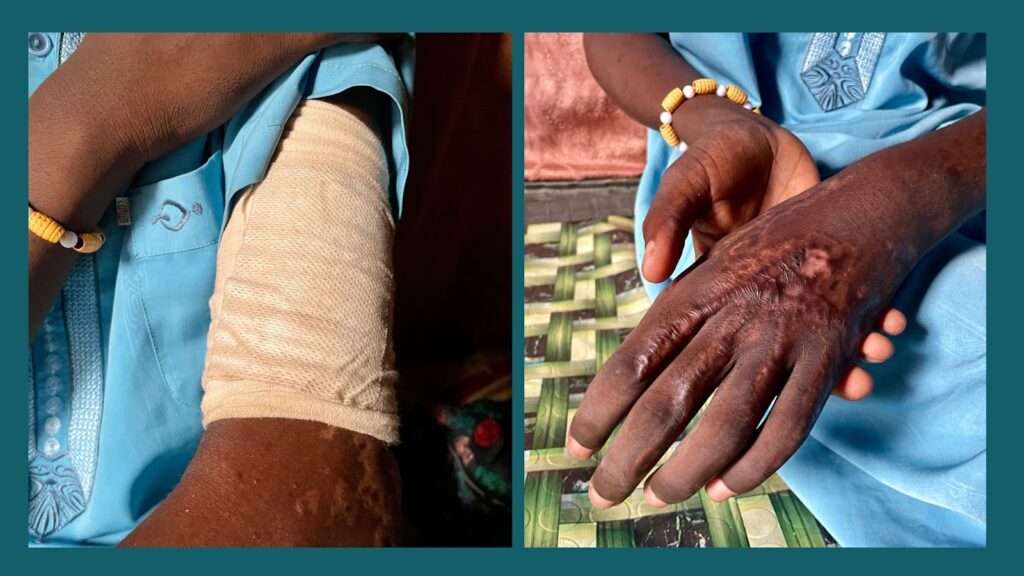The dusty roads of Nganzai local government area of Borno State, northeastern Nigeria, are often filled with sounds of construction work and resonating hopes of those seeking a day’s wage. Among them was Ibrahim Bandi, 27, a labourer who had travelled from Maiduguri, to work on a government construction site in the town.
After relocating to Nganzai, Ibrahim’s days became long and harsh under the scorching sun, yet the promise of the pay kept him and his colleagues going.
On the evening of Feb. 8, after another gruelling day, Ibrahim and about ten others sat by a building, trying to relax as they awaited the cool night air. They distracted themselves by watching a military movie on a smartphone via a Bluetooth speaker as they ate snacks and drank soft drinks.
Abba, who was with the group during the peaceful evening, expressed dissatisfaction with their late-night stay. “He insisted several times that we should go home and told us that staying out late was not a good idea. We pleaded that we would disperse after finishing the movie,” Ibrahim recalled their conversation, which ended up being the last time they would hear from Abba.
The night grew older, and by 10 p.m., they were still engrossed in the action movie, with the fictional explosions and gunshots briefly drowning out the silent threats that loomed around them.
“We heard the sounds, but we initially assumed they were part of the movie. Before I could confirm whether the gunshots were real, flying bullets surrounded us, plunging us into a state of horror and confusion,” Ibrahim explained.
Ibrahim and his friends were helpless due to the sudden shift from a fictional movie they were watching on the phone to a reality they could not accept. The sporadic gunshots scattered them into an unpredictable scene as they found themselves face-to-face with a Boko Haram attack.
Ibrahim narrated how he passed through the deadly attack: “Bullets started hitting us indiscriminately. I was first hit with a bullet on my left hand, the second bullet brushed my bag while I was crawling, the third bullet struck my thigh, and the fourth bullet hit my hand again.”

“I felt a sharp pain for each gunshot and then nothing. I thought I was going to die,” Ibrahim shared, reflecting on the moment he was hit.
Less than 15 minutes had passed since the entire attack began, yet for Ibrahim, it felt like an eternity. The air was heavy with the smell of gunpowder and the sounds of the injured crying out. Blood stained the surroundings, serving as a grim reminder of the brutality that was unfolding right before their eyes.
When the assault ceased, six men were dead, and four, including Ibrahim, were severely injured.
According to Ibrahim, fire also ignited at the scene. “Some of us were burnt by fire too, aside from the wounds we got from gunshots,” he said.
The next day, the survivors were rushed to a hospital in Maiduguri. Ibrahim underwent multiple surgeries and faced a long, painful recovery.
“We were conveyed to the Borno State Specialist Hospital in Maiduguri where the four of us who were severely wounded were hospitalised at the International Community of the Red Cross’ (ICRC) facility at the hospital premise,” Ibrahim told HumAngle.
As the physical wounds slowly healed, he was discharged on May 10 after spending 92 days in the hospital. However, the trauma of that night persisted, preventing him from resuming his former life.
Following his discharge, Ibrahim confronted each day with a profound feeling of emptiness and powerlessness, a stark reminder of how the ongoing conflict affected everyday people. Reflecting on his situation, Ibrahim remarked, “Every day is a challenge. I used to be the provider for my family, but now I feel like I’m just a burden.”
“I have nothing. The clothes I am wearing were given to me by a friend. I cannot work now because of my health condition, I cannot do hard work,” he said.
Today, Ibrahim has undergone a significant transformation. He now confronts a new reality. Once a vibrant labourer full of aspirations and resolve, he now faces each day with a deep sense of powerlessness, unable to resume the work that used to define his existence and provide for his family.
Ibrahim resides with his mother, elder brother, and younger sister along Baga Road in Maiduguri. They live in a residence within a host community in the area. Their father passed away in 2014 in their hometown, Nganzai, during an attack by Boko Haram. Following this tragic event, his family moved to Maiduguri and settled in the Bakasi IDP camp.
When the Borno state government shut down their camp in 2021 and relocated residents to various local government areas, Ibrahim’s family could not return due to fear of insecurity in Nganzai.
Over the period of his displacement, Ibrahim was able to complete his secondary education at a free public school, but he could not further his education because of poverty and the unending challenges faced by displaced families in the state.
Ibrahim previously worked as a labourer on construction sites, fending for himself and caring for his family. However, the attack of Feb. 8 completely changed his life, plunging him into a difficult situation.
Support Our Journalism
There are millions of ordinary people affected by conflict in Africa whose stories are missing in the mainstream media. HumAngle is determined to tell those challenging and under-reported stories, hoping that the people impacted by these conflicts will find the safety and security they deserve.
To ensure that we continue to provide public service coverage, we have a small favour to ask you. We want you to be part of our journalistic endeavour by contributing a token to us.
Your donation will further promote a robust, free, and independent media.

